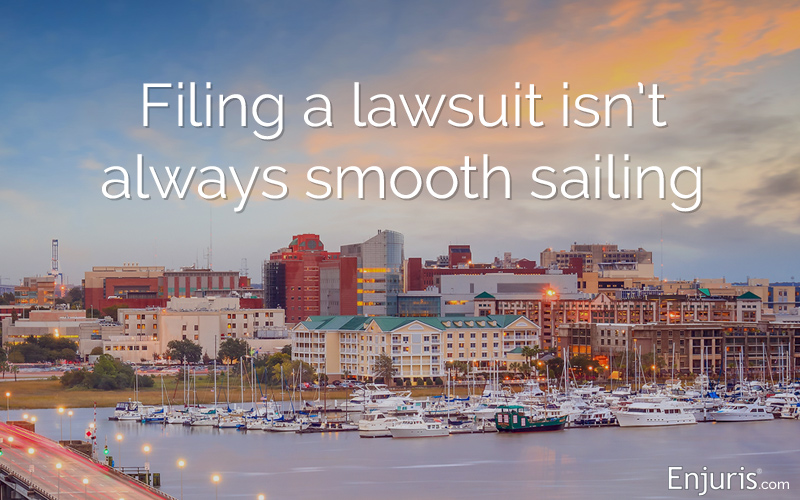
Find out what laws might impact your boat accident claim
To anyone familiar with South Carolina’s 3,000 miles of coastline, 8,000 miles of rivers, and 46,000 acres of lakes, it shouldn’t come as a surprise that boating is immensely popular in the Palmetto State.
In 2020, more than 500,000 boats were registered in South Carolina (roughly 1 boat for every 10 South Carolinians).
Although open bodies of water might feel like the Wild West when you’re jumping a wave, they’re heavily regulated by state and federal law. In this article, we’ll look at South Carolina boat accidents and the laws that might impact your accident claim.
South Carolina boat accident statistics
Boating in South Carolina used to be a lot more dangerous. In 1973, there were only 128,000 registered boats in the Palmetto State. Nevertheless, 64 people were killed in boating accidents that year alone. In contrast, only 15 people were killed in boating accidents in 2019, despite there being roughly 400,000 more registered boats.
Although boating safety is trending in the right direction, South Carolina is still one of the most dangerous states when it comes to boat accidents.
| South Carolina recreational boat accidents (2015-2019) | ||
|---|---|---|
| Year | Fatal accidents | Total accidents |
| 2015 | 15 | 123 |
| 2016 | 20 | 136 |
| 2017 | 12 | 151 |
| 2018 | 15 | 130 |
| 2019 | 15 | 141 |
| Source: U.S. Coast Guard accident statistics | ||
Common causes of boat accidents
Every year, the U.S. Coast Guard releases its Recreational Boating Statistics report, which identifies the top 5 accident types and the top 10 boat accident contributing factors:
| Top 5 boat accident types (2019) | |||
|---|---|---|---|
| Accident type | Number of accidents | Number of deaths | Number of injuries |
| Collision with a recreational vehicle | 1,071 | 47 | 650 |
| Collision with a fixed object | 493 | 44 | 326 |
| Flooding/swamping | 413 | 16 | 253 |
| Grounding | 399 | 45 | 124 |
| Falls overboard | 299 | 189 | 122 |
| Top 10 boat accident contributing factors (2019) | |||
|---|---|---|---|
| Contributing factor | Number of accidents | Number of deaths | Number of injuries |
| Operator inattention | 546 | 36 | 296 |
| Improper lookout | 506 | 26 | 425 |
| Operator inexperience | 458 | 39 | 273 |
| Machinery failure | 358 | 22 | 325 |
| Excessive speed | 282 | 113 | 221 |
| Alcohol use | 274 | 18 | 93 |
| Force of wake/wave | 235 | 21 | 141 |
| Weather | 184 | 31 | 58 |
| Navigation rules violation | 170 | 48 | 87 |
| Hazardous water | 140 | 12 | 117 |
South Carolina boating laws and regulations (before you get in the water)
Let’s look at a few of the laws you need to know before you put your boat in the water.
Boat licensing and registration
With a couple of very narrow exceptions, you must have a South Carolina Certificate of Number (registration) and validation decals to operate your boat legally on public waters in South Carolina.
To obtain the Certificate of Number and validation decals, you must submit the proper application and fee to the South Carolina Department of Natural Resources (SCDNR).
Boat registration is valid for 1 year, and the SCDNR must be notified when your boat is transferred to another owner, you change your address, or your boat is destroyed.
Who can operate a boat in South Carolina?
In South Carolina, people 16 years of age or older may operate a boat or personal watercraft (PWC) without restrictions.
People under the age of 16 may operate:
- A boat or PWC powered by less than 15 horsepower without restrictions
- A boat or PWC powered by 15 horsepower or more if they’re accompanied by an adult (18 years or older) who is not under the influence of alcohol or drugs, or if they’ve passed a boating safety course approved by SCDNR.
Required equipment
Before you venture into the water, you’ll need to make sure the required equipment is onboard. You can find a detailed list of equipment in Title 50, Chapter 21 of the South Carolina Code of Laws. Here are the highlights:
- Personal flotation devices. All boats and PWC’s must have at least 1 Type I, II, III, or V personal flotation device onboard. What’s more, children under 12 years of age on a boat (and everyone on a PWC regardless of age) must actually wear a personal flotation device.
- Navigation lights. During periods of restricted visibility, power-driven boats less than 65.6 feet must display red and green sidelights visible from a distance of at least 2 miles away, and an all-round white light visible from a distance of at least 2 miles. Unpowered boats less than 65.6 feet long must exhibit red and green sidelights visible from at least 2 miles away and a stern light visible from at least 2 miles away. Finally, all boats are required to display a white light visible from all directions whenever they are moored or anchored outside a designated mooring area between sunset and sunrise.
- Fire extinguishers. With a few narrow exceptions, boats are required to have a Type B fire extinguisher onboard.
- Sound-producing devices. Boats less than 39.4 feet in length must have some way to make an efficient sound signal (e.g., handheld air horn, athletic whistle, etc.).
- Visual distress signals. Boats on federal water must be equipped with visual distress signals that are USCG-approved. In addition, all boats are required to carry night signals when operating between sunset and sunrise.
South Carolina boating laws and regulations (when you’re in the water)
Let’s look at a few of the laws you need to know when you’re operating your boat.
Duty of care
Boat operators are required to exercise a “reasonable degree of care” to protect the safety of everyone else on the water.
Speed limits
In general, you’re prohibited from operating a boat or PWC at speeds that may cause injury or damage.
What’s more, you may not operate a boat or PWC in excess of idle speed (the lowest speed at which a vessel can operate and maintain steering control) within 50 feet of:
- A moored or anchored boat
- A wharf, pier, or dock
- A person in the water
- A buoy or sign with the words “idle speed” or “no wake, idle speed”
Obstructing navigation
South Carolina law prohibits boat operators from doing any of the following:
- Anchoring a vessel in a traveled portion of a river or channel in a way that prevents other vessels from passing through the same area
- Mooring or attaching a vessel to a buoy, beacon, or other navigation aid
- Obstructing a pier, wharf, or boat ramp
Alcohol and drugs
South Carolina law prohibits anyone from operating a boat while under the influence of alcohol or drugs. Penalties include:
- First offense. Imprisonment between 48 hours and 30 days (or a fine). Loss of license for 6 months. Required safety course.
- Second offense. Imprisonment between 48 hours and 1 year. A fine of up to $5,000. Loss of license for 1 year. Required safety course.
- Third offense. Imprisonment between 60 days and 3 years. A fine of up to $6,000. Loss of license for 2 years. Required safety course.
What’s more, if the intoxicated boater causes an accident that seriously injures or kills someone, they are guilty of a felony BUI and the intoxicated boater faces penalties of up to 25 years in prison and a $20,000 fine.
Accident duties
Most people are familiar with hit-and-run accidents involving motor vehicles, but there are certain steps you need to take after a boat accident to avoid being charged with a hit-and-run as well.
After a boat accident, a boat operator must:
- Stop their vessel immediately at the scene of the accident,
- Assist anyone who is injured or in danger,
- Give, in writing, their name, address, and vessel identification to anyone injured and to the owner of any property damaged by the accident, and
- Report the incident by calling the SCDNR at 1-800-922-5431.
Establishing liability after a boat accident
To receive compensation for a boat accident, you need to prove that someone else failed to act with a reasonable degree of care and their carelessness caused your accident.
To put this in legal terms, you need to prove that someone else was negligent.
Parties that might be negligent in a boat accident include:
- Another boat operator
- A boat owner
- A manufacturer (in the case of a defective component)
Common examples of negligent actions on the water include:
- Crossing the path or wake of another boat unnecessarily close
- Boating in restricted areas
- Allowing passengers to ride on the bow, gunwale, transom, seatbacks, or any other place where there may be a chance of falling overboard
- Driving too fast for the conditions
A wrongful death lawsuit was filed by Mallory’s mother against 4 defendants who allegedly sold or gave alcohol to Paul Murdaugh, the suspected driver of the boat.
Murdaugh was indicted on 3 felony boating under the influence charges.
The case is currently pending.
How insurance may affect your case
If the at-fault party has boat liability insurance, you can file a claim against their insurance company. Unfortunately, boat liability insurance is NOT required in South Carolina.
Motor vehicle insurance does not cover boat injuries, but homeowner’s insurance might in some cases.
If the at-fault party doesn’t have insurance coverage, you’ll need to file a personal injury lawsuit against them to recover damages.
Types of damages available in a South Carolina boat accident
If you’re injured in a boat accident in South Carolina, you may be able to recover the following types of damages:
- Economic damages are the monetary losses caused by your accident (e.g., medical expenses, lost wages, property damage).
- Non-economic damages are the non-monetary losses caused by your accident (e.g., pain and suffering, loss of consortium).
- Punitive damages are intended to punish the defendant. Punitive damages are only available if the defendant’s actions were willful or reckless.
Ready to talk to an attorney about your boat accident claim? Find one using our free online directory.
See our guide Choosing a personal injury attorney.

